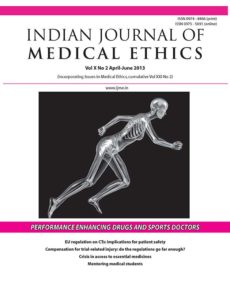
The year 2012-13 saw the framing of important new policies and rules concerning research, public health and clinical practice. Each of these needs scrutiny through the lens of the people’s welfare.
At the global level, the EU has drafted new regulation on applications for clinical trials. Two authors examine the implications for participants’ protection. From India, an editorial comments on new provisions governing compensation for clinical trial – related injury and death. Another commentator finds that the government’s Science Technology and Innovation Policy does not translate into inclusive development.
India’s drug industry has been hailed for supplying relatively inexpensive versions of lifesaving drugs. But the industry is not necessarily guided by public spirit. Two articles in the journal look at policy and regulation issues affecting access to affordable essential medicines of good quality. A group of scholars argues that India’s TB control programme is ethically obliged to provide the latest diagnostic tests and universal access to second-line drugs, to reduce the suffering caused by delayed diagnosis, drop-out and mistreatment.
An author advocates an analysis of the role of doctors in prescribing performance enhancing drugs in sports training. An editorial explores the evolving nature of trust between patient and doctor in an increasingly commercial healthcare environment.
Turning inward, two authors discuss the ethical challenges of managing unavoidable complications in clinical practice, and balancing innovation in technique with patient welfare. A third talks about the need for doctors to widen their perspective through wide and varied reading. Finally, a study discusses the effectiveness of a mentoring programme for first year medical students.
Cover credit: Spooky Pooka, Wellcome Images, London
